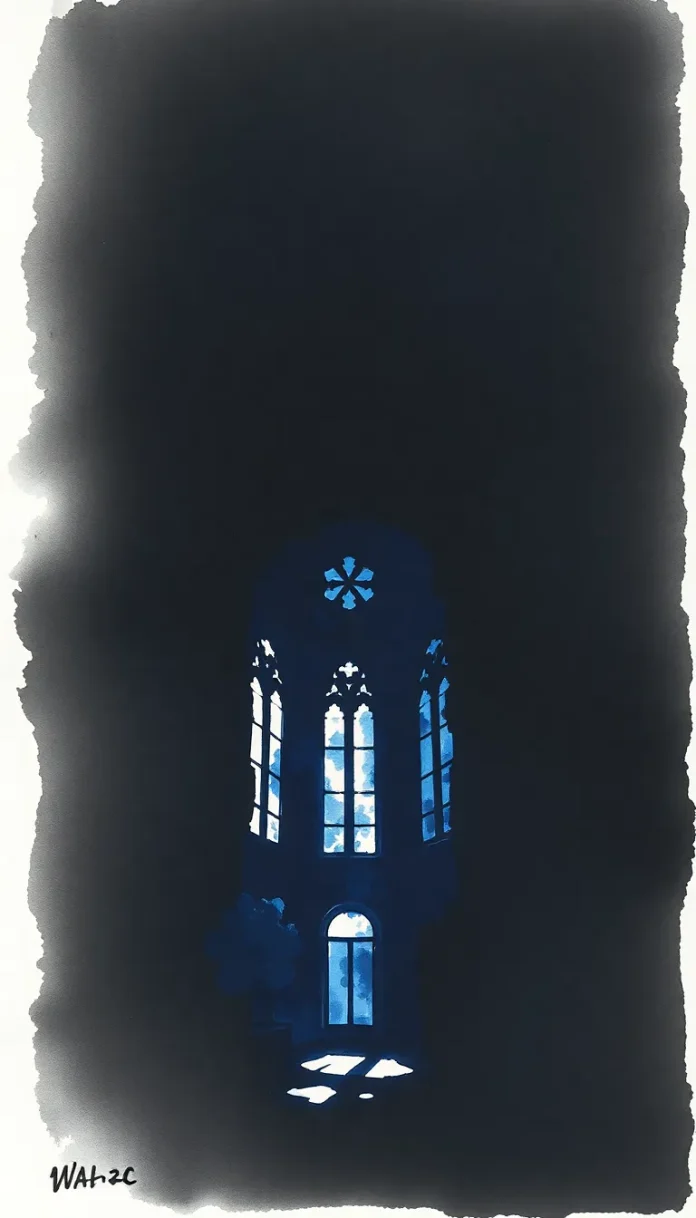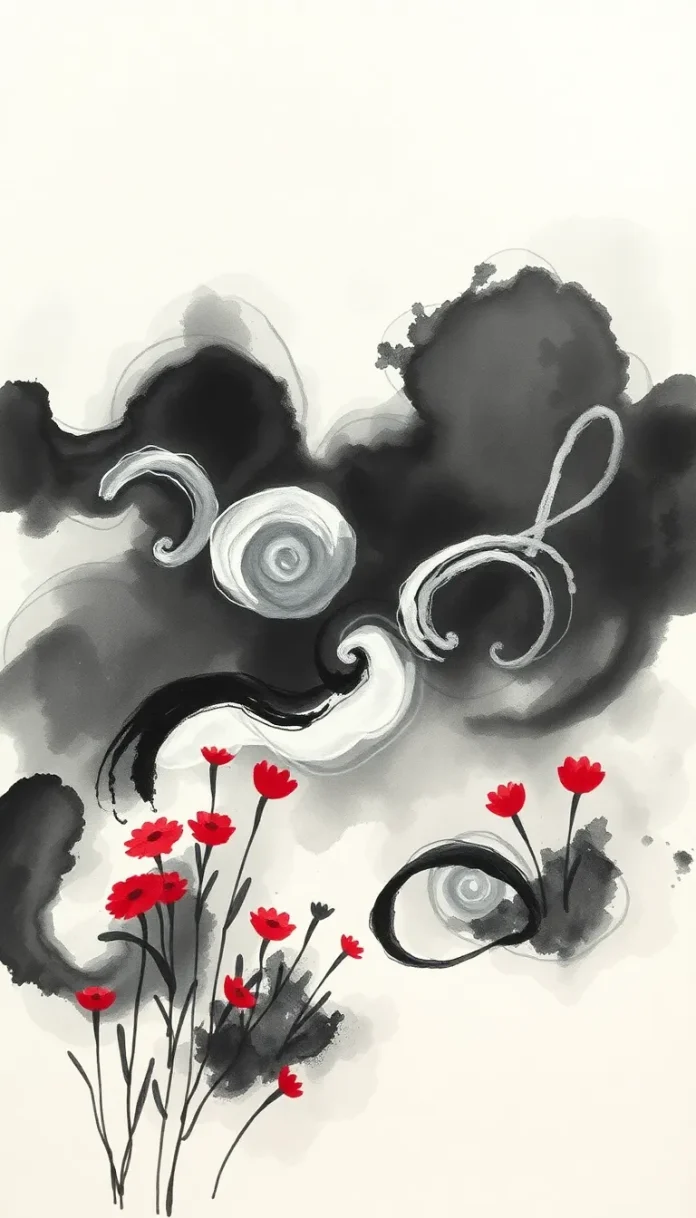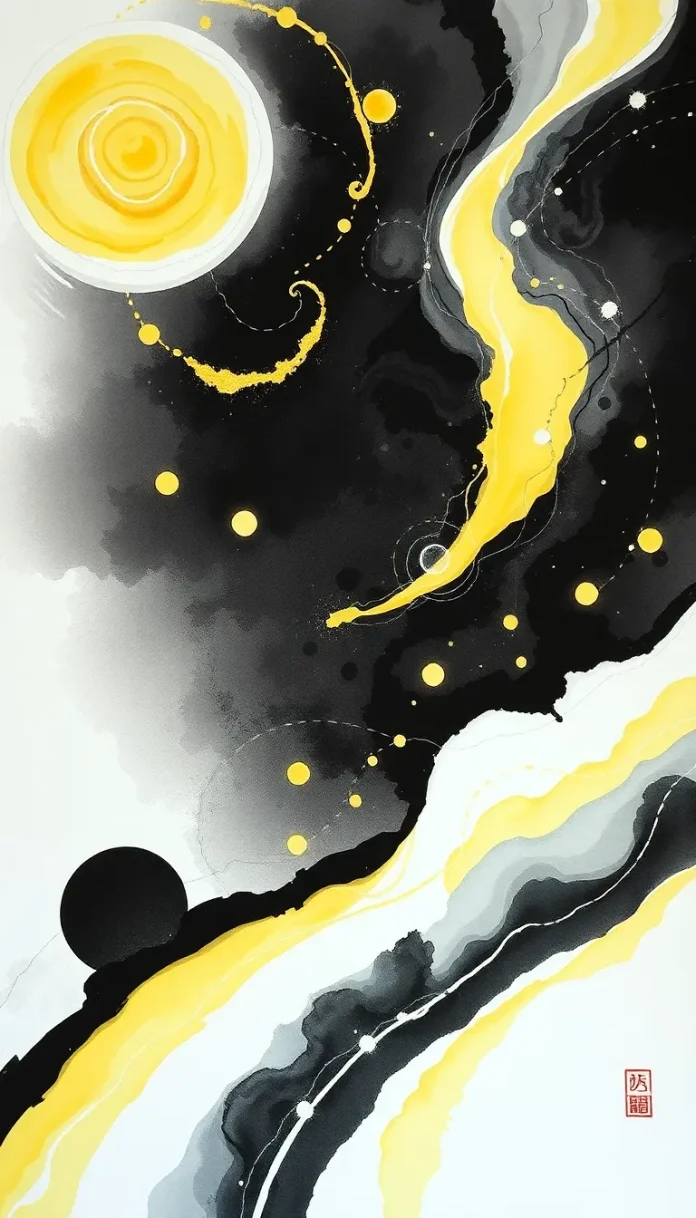The Ballad of the Forgotten Muse
Where war’s dread echo through the valleys mourn,
There dwelled a poet—misunderstood by men,
A soul of art, too pure for mortal ken.
Within a village lost to time’s decay,
Its cobbled lanes in silent grief did stray,
He etched his dreams on weathered parchment scrolls,
Yet none perceived the fire within his soul.
The burning fields of conflict scarred the land,
While steel and sorrow marched as hand in hand,
In cries of anguish, distant drums did sound,
Yet in this hamlet, beauty still was found.
Beneath a sky of ghostly silver light,
Our artist roamed through streets in deep twilight,
Where whispers of the past in rivulets flowed,
And secrets of old battles in shadows glowed.
I
Upon a crumbling wall he left his mark,
A portrait wrought in hues both bold and stark,
Of once proud dreams now lost in bitter strife,
And of a fragile hope that clung to life.
He sang his sorrow in a tender strain,
As if his heart alone might heal the pain,
But voices from the town, cold and austere,
Spoke naught but scorn—no warmth, no solace near.
II
One fated eve beneath the weeping skies,
When fate, like gentle wind, in silence flies,
A stranger came—a traveler of lost song,
Whose eyes, like twilight stars, burned fierce and long.
He gazed upon the artist with intent,
And in that glance, a spark of truth was lent;
For though the world in war’s despair did wane,
In that brief moment, hope was born again.
“Good sir,” the traveler softly thus addressed,
“Thy art—so deep—is weighed by hearts oppressed;
Pray tell, what doth stir thy anguished soul so tight,
In these cursed days of everlasting night?”
The artist paused—a silent tear did gleam,
Within his eyes, the sorrow of a dream;
“Alas, dear friend, my art is but a cry
Against a world where valor soon must die.
I paint the sorrow of a land unhewn,
Where silent hills and shadows mark its ruin;
In every stroke, the memory of peace,
Now lost to time as conflict finds its lease.”
III
Thus stirred the heart of that mysterious guest,
Who sensed inside the pain, a golden quest;
“For art,” he vowed, “must speak where words do fail,
And in thy grief, a richer tale unveil.
Together, let us venture ‘midst the scars,
Where war’s cruel hand hath marred our fragile stars;
In every ruined maze, in every breath,
We’ll seek the beauty hidden in thy death.”
So hand in hand, through fields of shattered fate,
They wandered on amidst the land sedate,
Where twisted wrecks of yore and tattered dreams
Melded into one amidst sorrow’s streams.
The traveler taught the artist lore of old,
Of valor unassumed, yet bright and bold,
And in return, the artist poured his soul
Into verses wrought with art as pure as gold.
IV
The nights were long, the days in grief entwined,
But in each other solace they did find;
For in the silent ruins of despair,
They kindled hope, a light both pure and rare.
Their dialogue—a cadence soft and sure,
Revealed the truth that hardship must endure:
“The tears of war may stain the earth so red,
Yet art, though wounded, rises from the dead.”
As autumn’s chill embraced the morrow’s gloom,
The people watched from windowed rooms,
Their hearts unyielding, steeped in old disdain,
For art that dared to kindle hope again.
No soul in that forsaken hamlet cared
For dreams aloud by those who war declared;
And in their silence lay the seeds of pain,
A bitter harvest borne of endless strain.
V
One fateful morn as light began to fade,
The traveler’s steps grew halting, deeply swayed;
For war, relentless, marched upon the vale,
Its iron tide, a never-ending tale.
A band of souls, ensnared in war’s cruel silk,
Did come, bearing ash and blood like bitter milk,
Their eyes aflame with duty’s grim command,
To purge the village and reclaim their land.
The artist gazed with terror in his muse,
While winds of destiny the fates transfuse;
“Must we, dear friend, now yield to dark despair,
And watch our gentle art be slain in air?”
The traveler, firm though bowed by grimacized fate,
Replied in tone both calm and yet sedate:
“Though fate be harsh, our art shall still remain,
A lament for those unjustly wrought in pain.”
VI
The clash commenced amid despair profound,
Where echoes of the dead did all around resound;
While soldiers’ cries in battle fierce did rise,
The artist and his friend did close their eyes.
For in that final hour of bitter war,
They chose to craft a truth that would endure;
Each word, each stroke, infused with grief and light,
A duet borne in sorrow’s dying night.
Beneath the scorched and splintered village wall,
Where once the seeds of hope did rise and fall,
They etched their names—a timeless woven phrase—
To mark the end of both their mortal days.
The artist, hands that trembled in the fray,
Continued his sublime art ‘til break of day,
As life itself receded in the gloom,
And war exhaled its final, vengeful plume.
VII
Then came the fateful stroke of Death’s cruel hand,
As destiny, with mercy hard to understand,
Did claim the traveler with a single breath,
A soul undone by war’s unyielding death.
The artist, torn by grief’s relentless storm,
Felt every moment strain his lonely form;
His art, once radiant with undying hope,
Now lay in ruins—unable still to cope.
“Alas,” he wept, with voice so strained and low,
“How can a tender heart so bright now glow
When all that’s pure must in despair be drowned
Within the ceaseless roar of war’s cruel sound?”
In that dark hour, amid the mourning scene,
He carved a verse—a final, mournful glean;
A hymn for all who dared to dream in vain,
A requiem for loss, for grief, for pain.
VIII
Now silent lies the village, long forgot,
Its soul enshadowed by the battles wrought;
The artist lingers, bound to hallowed ground,
Where memory and sorrow intertwine, unbound.
A solitary monument to dreams undone,
He haunts the ruins till the fading sun,
His voice—a ghostly echo through the night,
Entreating those who pass in mute delight:
“Remember me in art, in love, in plea,
Though war may rage, let beauty always be.
For in the darkest hours of despair,
Our art gives meaning to the pain we bear.”
But naught but wind replied to his lament,
Inscrutable fate, so harshly unrelent;
The village slept beneath a mournful sky,
A silent testament to love’s goodbye.
IX
As seasons turned and time bore on its way,
The scars of war did slowly fade to gray,
Yet in that hallowed ground where dreams did die,
The artist’s verse yet whispered—soft and shy.
In every broken stone and shattered beam,
Lies woven hope, as fragile as a dream;
And though the traveler’s light turned to a shade,
Their bond endures, though mortal flesh doth fade.
In solemn quiet, where fate’s hand is drawn,
The legacy of art remains at dawn;
A tragic song of lives so harshly marred,
Where beauty fought against the deathly shard.
For every soul that wanders lost and lone,
May find in art a refuge, deep as stone;
And though the ending breaks the heart in two,
The mournful truth unveils itself anew.
X
The final verse now crowns this dirge complete,
A crown of sorrow where the past and present meet;
Our artist, with his soul in endless night,
Stands ‘gainst the ruin, ever seeking light.
But fate, inexorable with its grievous might,
Did claim his form as day succumbed to night;
And in that fateful, searing, grim decree,
The village wept, its spirit lost at sea.
Thus ends the tale—tragic, pure, and grand,
A legacy of art carved by a pained hand;
Where war’s dark specter in the annals roams,
And sorrow winds in every brick and stone.
O melancholy muse, forever mourn,
Thou art the echo of a love forlorn;
A mournful requiem that endless sings,
For all the hearts that war relentlessly stings.
So let these verses in thy memory dwell,
A solemn past where broken dreams compel;
And though the ending bleeds with bitter art,
It stirs the soul, it haunts the human heart.
For tragedy, though harsh its cruel decree,
Unveils our shared, immortal agony;
In every line, the timeless truth is spun—
That art remains, though all is said and done.


